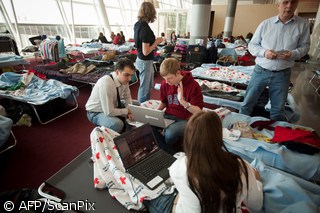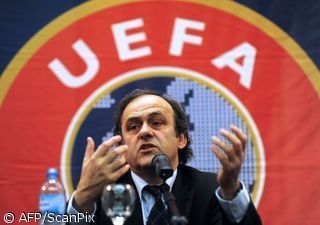An acronym that had dominated headlines at previous CeBIT shows seemed to be little more than a footnote at this year's event
Published:
18 March 2003 y., Tuesday
An acronym that had dominated headlines at previous CeBIT shows seemed to be little more than a footnote at this year's event. The buzz that once accompanied 3G (third-generation) broadband mobile Internet appears to have fizzled even before the service has taken off.
Grabbing the attention this year were wireless technologies, such as Wi-Fi and Bluetooth, that are, above all, available.
Indeed, handset availability, which dogged the start of GSM (Global Service for Mobility Communications) in Europe over a decade ago, threatens to trip mobile operators eager to expand into the market for high-speed mobile Internet services.
Continuing a troubling trend in the European mobile industry, Jьrgen von Kuczkowski, head of Vodafone Group PLC's German unit, said last week in Hanover that the operator will delay the launch of commercial 3G service, this time to the second half of 2003 and only then if enough handsets are available. But Kuczkowski was quick to defuse speculation of possible difficulties, should the operator be forced to announce yet another delay. "There will be no Big Bang" when the German subsidiary launches 3G, he said. "It's not at all important if you start a few weeks earlier or later."
For the record, the delay has been nearly a year. Vodafone D2 GmbH has been paying interest on a huge loan for its Ђ8.5 billion (US$9.2 billion) 3G license acquired more than two years ago, while generating zero revenue from the new mobile broadband service during this time.
Now Kuczkowski is talking about testing 3G with a select number of business users over the next few months. He has also dropped some price points: 3G handsets will cost around Ђ300 and fees for the new high-speed packet-based data services will be low enough to compete with the competition. Those remarks were aimed at rival T-Mobile Deutschland AG, which announced plans ahead of CeBIT to cut its mobile data fees for GPRS (General Packet Radio Service) up to 70 percent, with handsets to range from Ђ100 to Ђ500.
T-Mobile and Vodafone account for roughly 70 percent of the German mobile market, the largest in Europe.
Šaltinis:
itworld.com
Copying, publishing, announcing any information from the News.lt portal without written permission of News.lt editorial office is prohibited.
The most popular articles
 This Saturday, 24 April, the Carlos de Amberes Foundation is hosting two conferences of European experts on the environment and sustainability and immigration policies in the EU, organised by the Allianz Cultural Foundation in the context of the Allianz Alumni Academy.
more »
This Saturday, 24 April, the Carlos de Amberes Foundation is hosting two conferences of European experts on the environment and sustainability and immigration policies in the EU, organised by the Allianz Cultural Foundation in the context of the Allianz Alumni Academy.
more »
 The Trident-Oberoi Hotel in Mumbai to reopen, following renovations after militant attacks in 2008
more »
The Trident-Oberoi Hotel in Mumbai to reopen, following renovations after militant attacks in 2008
more »
 Fresh from their wedding in Jamaica, British tourists Siobhan and David Monteith never thought for a minute that a volcano would interrupt their honeymoon.
more »
Fresh from their wedding in Jamaica, British tourists Siobhan and David Monteith never thought for a minute that a volcano would interrupt their honeymoon.
more »
 The streets of Manila filled with a colourful display on wheels, just days before the world celebrates Earth Day’s 40th anniversary.
more »
The streets of Manila filled with a colourful display on wheels, just days before the world celebrates Earth Day’s 40th anniversary.
more »
 Tens of thousands of Ugandans flocked to the hilltop palace of Africa’s youngest tribal ruler for two days of noisy parties marking a decade in power for the 18-year-old king.
more »
Tens of thousands of Ugandans flocked to the hilltop palace of Africa’s youngest tribal ruler for two days of noisy parties marking a decade in power for the 18-year-old king.
more »
 Colourful warriors leap across the stage at the 6th annual Songjiang Battle Array, in Neimen, southern Taiwan.
more »
Colourful warriors leap across the stage at the 6th annual Songjiang Battle Array, in Neimen, southern Taiwan.
more »
 Consumers benefit from greater use of European product safety alert system and more effective market surveillance.
more »
Consumers benefit from greater use of European product safety alert system and more effective market surveillance.
more »
 Representatives from all Member States are gathering for two days in Zaragoza from 15 to 16 April to discuss how migrant integration can become a driver for social cohesion in the EU.
more »
Representatives from all Member States are gathering for two days in Zaragoza from 15 to 16 April to discuss how migrant integration can become a driver for social cohesion in the EU.
more »
 The much heralded "citizens initiative" to change EU laws has been given a cautious welcome by MEPs. Under the scheme - a major innovation of the Lisbon treaty - a million people can back a plan to introduce European legislation.
more »
The much heralded "citizens initiative" to change EU laws has been given a cautious welcome by MEPs. Under the scheme - a major innovation of the Lisbon treaty - a million people can back a plan to introduce European legislation.
more »
 Football shares Europe's values of integration, solidarity and social inclusion, and can play a significant role in helping the EU to promote them, especially at the local level where clubs are part of their local communities.
more »
Football shares Europe's values of integration, solidarity and social inclusion, and can play a significant role in helping the EU to promote them, especially at the local level where clubs are part of their local communities.
more »